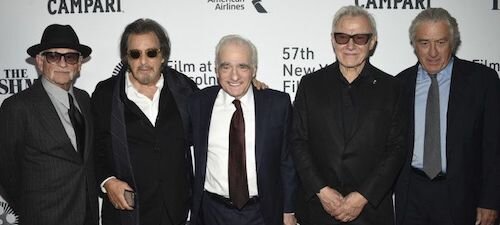Martin Scorsese: His Views on Superhero Films
It’s very hard to dismiss something Martin Scorsese would say entirely. The esteemed American filmmaker has been one of the most influential forces in contemporary cinema. He has created game changing films (inspired more by the works of world cinema than those made by fellow Americans), helped push the preservation of film ahead (with his company The Film Foundation), and has been his own form of a critic through his interviews with journalists and other critics (where he exposes films for readers to learn about). It’s easy to say that Scorsese isn’t uneducated on the subject, especially when he’s arguably one of the greatest students of film out there.
So, he came under fire recently when he compared the unstoppable Marvel films (and most superhero films of any sort) to “theme parks”. His interview (found here) has Scorsese reflecting on the current trends of filmmaking, and he responded by saying “I don’t see [Marvel films]. I tried, you know? But that’s not cinema.” He continued by iterating the following:
“Honestly, the closest I can think of them, as well made as they are, with actors doing the best they can under the circumstances, is theme parks. It isn’t the cinema of human beings trying to convey emotional, psychological experiences to another human being.”
Scorsese promoting his film Silence.
Well. I can imagine that would bother many readers. However, let me try and play devil’s advocate. I feel like this is a media outlet with a slanted angle trying to wring some juice out of Scorsese’s response. I mean, let’s be honest, here. Most interviewees get flack for the unpopular comments they make, when the interviewers putting up these questions don’t get hit by any form of shrapnel at all. In this case, it’s almost as clear as day that Scorsese was asked about this topic, even before you read the actual interview. When would Scorsese willingly talk about Marvel films when trying to promote a film like The Irishman?
Secondly, is anyone even surprised? It took Robert DeNiro to create miracles for Scorsese to even consider directing Raging Bull: he never wanted to make a sports film. So, of course he’s going to respectfully decline to blindly sing the praises for action films of this nature. Sure, a number of Scorsese films have violence, swearing and sex, but really take a step back and recognize that he himself has never made an action film. The Departed does not count, especially because it has ties to Hong Kong thriller cinema more than it does with American blockbuster culture.
Ultimately, Scorsese is — again — a student of cinema. He picks apart how movies are made, and tries his own hand at reassembling elements year after year. We all love Goodfellas, but honestly compare it to something even like Heat or Scarface (I’m ignoring gangster or crime films by Francis Ford Coppola or Sergio Leone, because they’re cut from the same cloth as Scorsese). Not to say these films are bad, but Goodfellas is clearly different with its core foundations and focuses. If Scorsese were to ever attempt an action film, you could guarantee it would not feel like your usual flicks; that doesn’t mean it would be better, might I add.
Scorsese and the cast of The Irishman.
Lastly, to tread backwards a little bit, I truly feel this was an article hiding the true intention of what Scorsese tried to mean. For some people, cinema holds a specific definition that doesn’t cover every single film. While I don’t hold that same opinion, I can understand what Scorsese means. To him, cinema is the piecing together of a story the old fashioned way: with the main focuses on plot, character development, artistic merits, and post editing poise. It’s impossible to insist that Marvel films (or the like) don’t carry any of these traits: they must, since they are also films. You can clearly understand what he’s trying to say, though. It’s like comparing Iron Man to The Red Shoes: both are thrilling films in vastly different ways. Iron Man is a popcorn film that works as a palette of special effects and action conventions. The Red Shoes is a work of art that slowly builds up to a crescendo, like a symphony.
Scorsese was simply trying to say this type of entertainment (typical mainstream high budgeted franchise films) are not his cup of tea. He gave them a shot. It didn’t work out. He won’t spend any more time watching them. Why should he have to, though? I will end on this note of ambiguity, though. Scorsese is knowledgable of the oldest films ever created, and the idea of the “cinema of attractions” (created by writer Tom Gunning). Gunning deduced that films can entertain not simply on a narrative level, but on a more interactive wavelength. Who’s to say that this gaze has not changed with time? Not to try and push an agenda that’s pro Marvel (believe me, I have my own love-hate relationship with all of these films), but that notion alone — to me — signifies that Scorsese can’t deny that these films are cinema to an extent. They’re not his cinema, just like they’re hardly my own. However, they’re still films through and through.
At this point, it’s cinematic philosophy, and the art of the debate. Technically, most modern productions aren’t even films (since they are shot digitally, and aren’t projected by having light pass through literal film), but the definition can clearly change depending on the person. Cinema has not changed for Scorsese. That’s simply it. There’s nothing wrong with that. I don’t consider what he said to be an insult towards the Marvel brand, and clearly his remarks are to be taken with a grain of salt. Luckily, most professional responses (including ones by Samuel L. Jackson and James Gunn) have been mature and understanding. Plus, at the end of the day, let’s pretend he hated the series for his own personal reasons. Isn’t a guy like Scorsese allowed to be? It might hurt that one of America’s strongest mainstream filmmakers may not like your film, but so what?
Andreas Babiolakis has a Masters degree in Film and Photography Preservation and Collections management from Ryerson University, as well as a Bachelors degree in Cinema Studies from York University. His favourite times of year are the Criterion Collection flash sales and the annual Toronto International Film Festival.




